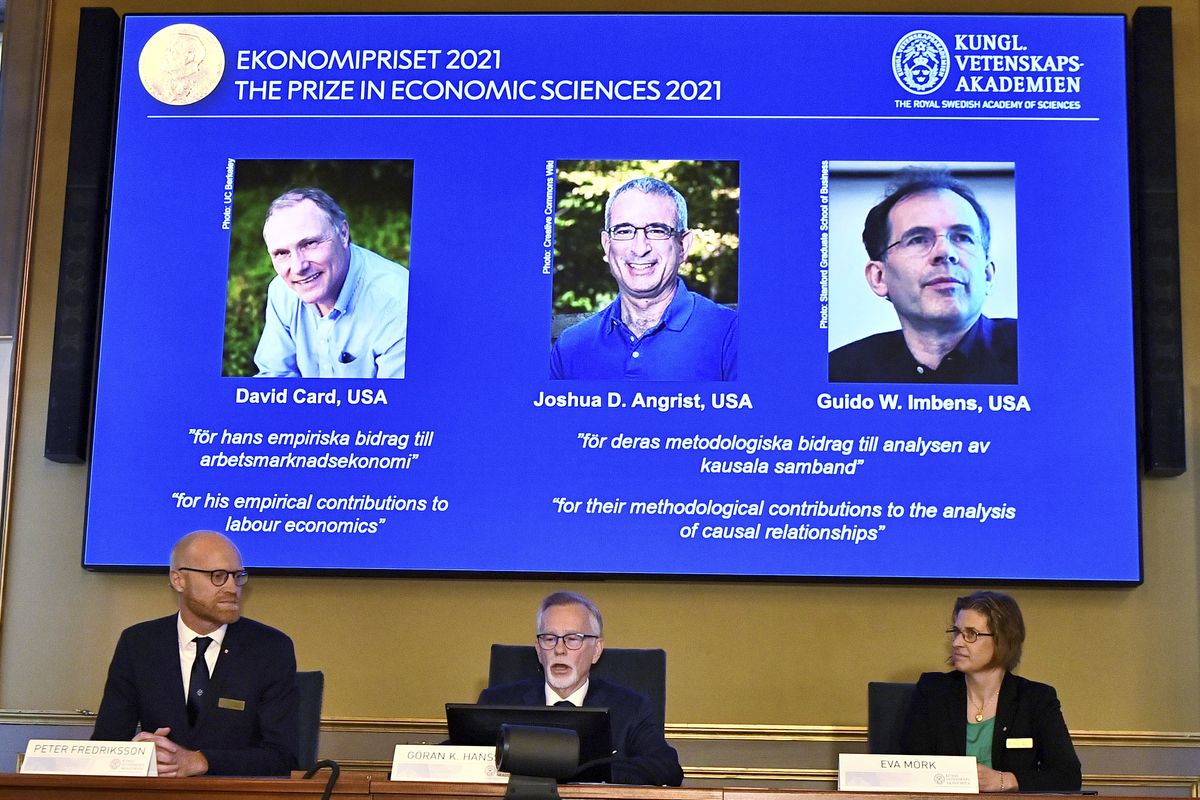3 US-based economists win Nobel for research on wages, jobs

STOCKHOLM – A U.S.-based economist won the Nobel prize in economics Monday for pioneering research that transformed widely held ideas about the labor force, showing how an increase in the minimum wage doesn’t hinder hiring and immigrants do not lower pay for native-born workers. Two others shared the award for developing ways to study these types of societal issues.
Canadian-born David Card of the University of California, Berkeley, was awarded half of the prize for his research on how the minimum wage, immigration and education affect the labor market.
The other half was shared by Joshua Angrist of the Massachusetts Institute of Technology and Dutch-born Guido Imbens of Stanford University for their framework for studying issues that can’t rely on traditional scientific methods.
The Royal Swedish Academy of Sciences said the three “completely reshaped empirical work in the economic sciences.”
Together, they helped rapidly expand the use of “natural experiments,” or studies based on observing real-world data. Such research made economics more applicable to everyday life, provided policymakers with actual evidence on the outcomes of policies, and in time spawned a more popular approach to economics epitomized by the blockbuster bestseller “Freakonomics,” by Stephen Dubner and Steven Levitt.
In a study published in 1993, Card looked at what happened to jobs at Burger King, KFC, Wendy’s and Roy Rogers when New Jersey raised its minimum wage from $4.25 to $5.05, using restaurants in bordering eastern Pennsylvania as the control – or comparison – group. Contrary to previous studies, he and his late research partner Alan Krueger found that an increase in the minimum wage had no effect on the number of employees.
Card and Krueger’s research fundamentally altered economists’ views of such policies. As noted by the Economist magazine, in 1992 a survey of the American Economic Association’s members found that 79% agreed that a minimum wage law increased unemployment among younger and lower-skilled workers. Those views were largely based on traditional economic notions of supply and demand: If you raise the price of something, you get less of it.
By 2000, however, just 46% of the AEA’s members said minimum wage laws increase unemployment, largely because of Card and Krueger.
Their findings sparked interest in further research into why a higher minimum wouldn’t reduce employment. One conclusion was that companies are able to pass on the cost of higher wages to customers by raising prices. In other cases, if a company is a major employer in a particular area, it may be able to keep wages particularly low, so that it could afford to pay a higher minimum, when required to do so, without cutting jobs.
“That really surprising evidence on the impact of the minimum wage has shaken up the field at a very fundamental level,” said Arindrajit Dube, an economics professor at the University of Massachusetts, Amherst.
Krueger would almost certainly have shared in the award, Dube said, but the economics Nobel isn’t awarded posthumously.
Card also found that an influx of immigrants into a city doesn’t cost native workers jobs or lower their earnings, though earlier immigrants can be negatively affected.
Card studied the labor market in Miami in the wake of Cuba’s sudden decision to let people emigrate in 1980, leading 125,000 people to leave in what became known as the Mariel Boatlift. It resulted in a 7% increase in the city’s workforce. By comparing the evolution of wages and employment in four other cities, Card discovered no negative effects for Miami residents with low levels of education.
Follow-up work showed that increased immigration can have a positive impact on income for people born in the country.
Angrist and Imbens won their half of the award for working out the methodological issues that allow economists to draw solid conclusions about cause and effect even where they cannot carry out studies according to strict scientific methods.
The award comes with a gold medal and over $1.14 million. Unlike the other Nobel prizes, the economics award wasn’t established in the will of Alfred Nobel but by the Swedish central bank in his memory in 1968. It is the last prize announced each year.